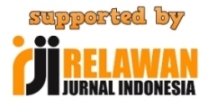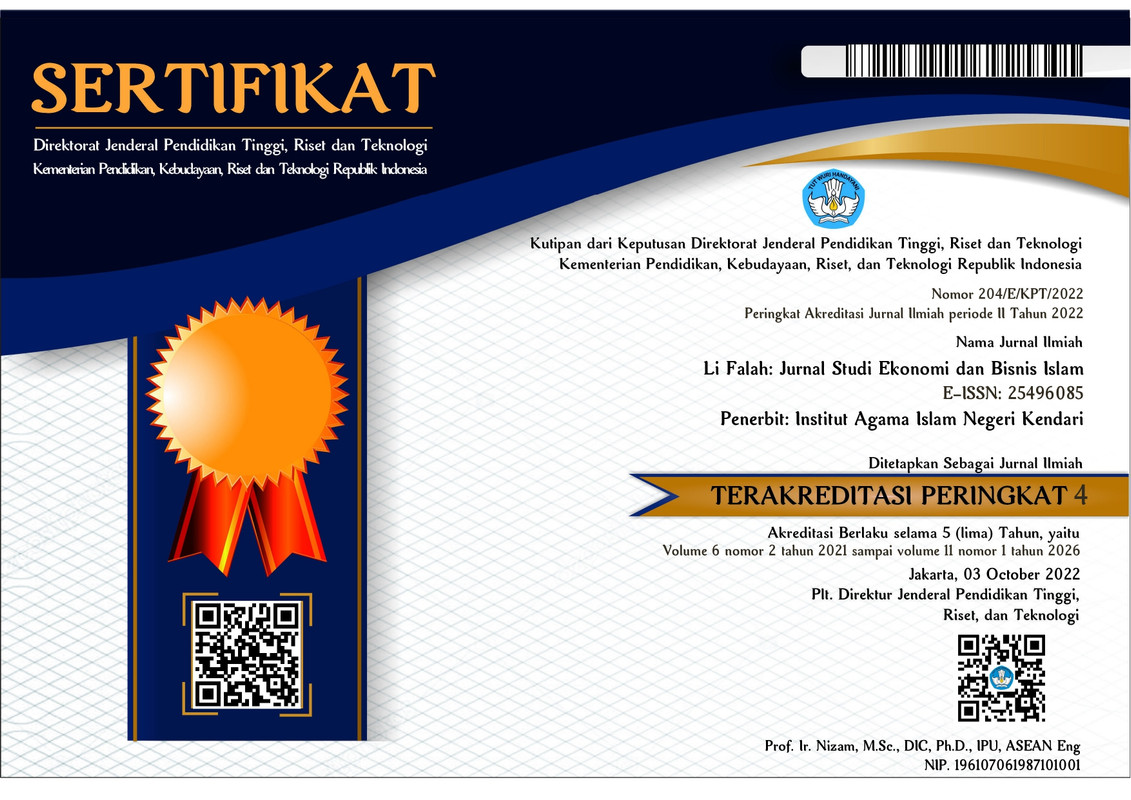Moderating Knowledge on Planned Behaviour Theory Toward Intention of Using Islamic Financial Services
Abstract
Keywords
Full Text:
PDFReferences
Ajzen I (1985) From intentions to actions: a theory of planned behavior. Springer Berlin Heidelberg 11–39
Ajzen I (1991) The theory of planned behavior. Org Beh Plan Decis Process 50:179–211
Ajzen I (2002) Constructing a TPB questionnaire: conceptual and methodological considerations
Anon B (2009) Consumers doubt green efforts. Mark Manag 18:5–20
Rafia Afroz1 & Muhammad Mehedi Masud2 & Rulia Akhtar1 & Md. Ashraful Islam3 & Jarita Bt Duasa1 - Consumer purchase intention towards environmentally friendly vehicles: an empirical investigation in Kuala Lumpur, Malaysia- Environ Sci Pollut Res - Springer-
Basu A, Hicks R (2008) Label performance and the willingness to pay for fair trade coffee: across-national perspective. Int J Consum Stud 32: 470–478
Bhattacharya CB, Sen S (2004) Doing better at doing good: when, why and how consumers respond to corporate social initiatives. Calif Manag Rev 47(1):9–24. doi:10.2307/3850493
Bockman S, Razzouk Y, Sirotnik B (2009) Going green—from left to center stage: an empirical perspective. J Am Acad Bus 14(2):8–17
Darnall N, Pointing C, and Vazquez-Brust DA (2012) Why consumers buy green. Green Growth Manag Transit Sustain Econ 287–308
Eck S (2009) Teures Gewissen. Werben & Verkaufen 8 22
Ferguson K (2011) Consumer perceptions of green: are we expecting too much? Available at SSRN 1909604
Finisterra P, Arminda M, Raposo B, Lino M, Leal W (2009) Identifyingthe green consumer: a segmentation study. J TargetMeas AnalMark 17:17–25
Kanarattanavong A, Ruenrom G (2009) The model of corporate environmentalism: the effects of perceived market uncertainty uponmarketing, environmental, and social performance. Bus Rev Camb 12(2): 140–147
Oskamp S (1977) Attitudes and opinions. Prentice-Hall, New Jersey
Otoritas Jasa Keuangan (2019), Survei Literasi Keuangan dan Keuangan Inklusif.
Sen S, Bhattacharya CB (2001) Does doing well always lead to doingbetter? Consumer reactions to corporate social responsibility. JMark Res 38(2):225–243, http://www.jstor.org/pss/1558626
Staats H (2003) Understanding proenvironmental attitudes and behavior: an analysis and review of research based on the theory of planned behavior. In: Bonnes M, Lee T, Bonaiuto M (eds) Psychological theories for environmental issues. Ashgate,
Aldershot Tikir A, Lehmann B (2011) Climate change, theory of planned behaviour and values: a structural equation model with mediation analysis. Clim Chang 104(2):389–402
Vermeir I, Verbeke W (2006) Sustainable food consumption: exploring the consumer Battitude-behavioral intention^ gap. J Agric Environ Ethics 19(2):169–194
Young A (2004) The octagon model of volunteer motivations: results of a phen Abd Rahman, A., Asrarhaghighi, E., & Ab Rahman, S. (2015). Consumers and Halal cosmetic products:knowledge, religiosity, attitude and intention. Journal of Islamic Marketing, 6(1), 148–163.
Anggelina, J., & Japarianto, E. (2014). Analisis Pengaruh Sikap, Subjective Norm dan Perceived Behavioral Control terhadapa Purchase Intention Pelanggan Sogo Department Store di Tunjungan Plaza Surabaya.Jurnal StrategiPemasaran, 2(1), 1–7.
Anoraga, Pandji.(2010). Manajemen Bisnis.Jakarta : PT. Rineka
Kusuma, I. D., & Untarini, N. (2014). Pengaruh Pengetahuan Produk Terhadap Niat Beli Dengan Sikap Sebagai Variabel Intervening. JurnalIlmu Manajemen, 2.
Ma, Y. (2005). The Role of Consumer Pengetahuan in Consumer Evaluations of Brand Extension Yun Ma A thesis submitted toAuckland University of Technology in partial fulfilment of the degree of Master of Business. Brand.University of Technology in partial fulfilment of the degree of Master of Business.
Karina Indah Rohmatun1, Citra Kusuma Dewi, 2017, Pengaruh Pengetahuan Dan Religiusitas Terhadap Niat Beli Pada Kosmetik Halal Melalui Sikap. Jurnal Ecodemica, Vol. 1 No. 1 April 2017omenological analysis. Int J Volunt Nonprofit Org 15(1):21–46
Rozandy, Rizki Aditya, (2016), Analisis Variabel-Variabel yang Mempengaruhi Tingkat Adopsi Teknologi dengan Metpde Partial Least Square (Studi Kasus Pada Sentra Industri Tahu DesaSendang, Kec.Banyakan, Kediri)”, Jurnal Industria Vol 1 No 3, 151.
Juliandi, A. (2018). Structural equation model based partial least square (SEM-PLS): Menggunakan SmartPLS. Pelatihan SEM-PLS Program Pascasarjana Universitas Batam on December,16-17 2018. Batam: Universitas Batam. DOI: 10.5281/zenodo.253800
Bellman, Lawrence M. 2009. Fashion Accessory Buying Intentions Among Female Millennials. Review of Business; 30 (1) pg: 46-57
Burhanudin, Erwin dan Siti Nurul Ngaini. 2005. Analisis Minat Konsumen untuk Bertransaksi pada Perbankan Syariah di Kota Yogyakarta. Sinergi, Kajian Bisnis dan Manajemen, h: 31-40
Dominanto, Nedi Nugrah. 2008. Perbedaan Sikap terhadap Iklan, Merek dan Niat Beli Konsumen pada Iklan dengan Fear Appeal Tinggi dan Rendah pada Partisipan Wanita. Jurnal Ekonomi dan Bisnis 2 (2), h: 67-75
Downs, Danielle Symons et al. 2006. Youth Exercise Intention and Past Exercise Behavior: Examining the Moderating Influences of Sex and Meeting Exercise Recommendations. American Alliance for Health, Physical Education, Recreation and Dance, 77 (1), pp: 91-99
Dunn, Michael S et al. 2001. The Influence of Significant Others on Attitudes, Subjective Norms and Intentions Regarding Dietary Supplement Use Among Adolescent Athletes. ProQuest, 36 (143); pg 583-591
Ferdinand, Augusty. 2002. Structural Equation Modeling dalam Penelitian Manajemen Aplikasi Model-model Rumit dalam Penelitian untuk Tesis Magister & Disertasi Doktor. Edisi Kedua. Semarang : BP UNDIP
Gan, Christopher et al. 2008. Consumers’ Purchasing Behavior towards Green Products in New Zealand. Innovative Marketing, 4 (1), pp: 93-102
Istiana, dkk. 2010. Pengaruh Sikap, Norma Subyektif dan Kontrol Keperilakuan Terhadap Niat dan Perilaku Beli Produk Susu Ultra High Temperature. Semiloka Nasional.
Mada, Yudhi Prasetya. 2005. Analisis Pengaruh Sikap terhadap Perilaku, Norma Subyektif dan Kontrol Kepemilikan yang Dirasakan terhadap Niat dan Perilaku Konsumen. Infestasi, 1 (1), h: 79-88
Marhaini. 2008. Analisis Perilaku Konsumen dalam Pembelian Komputer Merek Acer (Studi Kasus: Mahasiswa Fakultas Ekonomi Universitas Sumatera Utara). Jurnal Manajemen Bisnis, 1 (3), h: 89-96
Mukodim, Didin dan Erliansyah. 2007. Variabel yang Mempengaruhi Keputusan Konsumen dalam Membeli Produk Telepon Seluler. Jurnal Ekonomi Bisnis 12 (3), h: 220-229
Sigit, Murwanto. 2006. Pengaruh Sikap dan Norma Subyektif terhadap Niat Beli Mahasiswa sebagai Konsumen Potensial Produk Pasta Gigi Close Up. Jurnal Siasat Bisnis, 11 (1), h: 81-91
Simamora, Bilson. 2002. Panduan Riset Perilaku Konsumen. Gramedia: Jakarta
Suprapti, Sri. 2010. Perilaku Konsumen Pemahaman Dasar dan Aplikasinya dalam Strategi Pemasaran. Udayana University Press : Denpasar
Sugiyono. 2009. Metode Penelitian Bisnis. Alfabeta: Bandung
Sumarwan, Ujang. 2004. Perilaku Konsumen. Ghalia Indonesia: Bogor
Tang, Zhongjun et al. 2011. Antecedents of Intention to Purchase Mass Customized Products. Journal of Product & Brand Management. 20 (4), pp: 316-326
Winarto. 2008. Pengaruh Sikap dan Norma Subyektif terhadap Minat dan Keputusan Memilih Kuliah di Universitas Hang Tuah Surabaya. Aplikasi Administrasi, 10 (1), h: 51-64
Ilham Maulana Saud, 2016, Pengaruh Sikap dan Persepsi Kontrol Perilaku Terhadap Niat Whistleblowing Internal-Eksternal dengan Persepsi Dukungan Organisasi Sebagai Variabel Pemoderasi, Jurnal Akuntansi dan Investasi, Vol. 17 No. 2, Hlm: 209-219
Mia Muktiana Banowati & Maimun Sholeh, 2018), FAKTOR-FAKTOR YANG MEMPENGARUHI NIAT MENABUNG DI BANK SYARIAH, Jurnal Ekonomi & Pendidikan, 15(1)
Siaran Pers Survei OJK 2019 Indeks Literasi Dan Inklusi Keuangan Meningkat, 7 November 2019, SP 58/DHMS/OJK/XI/2019
Kunti Saptasari, (2016), Pengaruh Religiusitas, Pengetahuan,dan Persepsi Nilai Kualitas terhadap Sikap dan Niat Menggunakan Bank Syariah di Indonesia, Tesis, UII Yogyakarta
Ida Royani Pasi (2017), Pengaruh Pengetahuan Dan Sikap Terhadap Perilaku Masyarakat Pada Bank Syariah, Jurnal Al-Qasd: Islamic Economic Alternative, Vol 1, No 2., DOI: http://dx.doi.org/10.22303/al-qasd.1.2.2017.189-201
Muhammad Muflih, Diharpi Herli Setyowati, Hasbi Assidiki, Radia Purbayati, Destian Arshad, Ruhadi Ruhadi (2020), Niat Perilaku Pengguna Tabungan Koperasi Syariah: Peran Pengetahuan Produk, Kepercayaan, Persepsi Keuntungan, dan Persepsi Kualitas, Vol 11 No 1 (2020): Prosiding 11th Industrial Research Workshop and National Seminar (IRWNS), DOI: https://doi.org/10.35313/irwns.v11i1.2178
Abdul Haris Romdhoni, Dita Ratna sari (2018), Pengaruh Pengetahuan, Kualitas Pelayanan, Produk, dan Religiusitas terhadap Minat Nasabah untuk Menggunakan Produk Simpanan pada Lembaga Keuangan Mikro Syariah, Jurnal ilmiah Ekonomi Islam, Vol 4, No 02 (2018)
Siti Nur Annisa Amalia (2018), Faktor-Faktor Yang Mempengaruhi Minat Individu Terhadap Financial Technology (Fintech) Syariah (Paytren) Sebagai Salah Satu Alat Transaksi Pembayaran (PendekatanTechnology Acceptance Model (TAM) dan Theory Of Planned Behavior (TPB), Jurnal Iqtishoduna, Vol 9 No 1 (2018): Juni 2018 , https://doi.org/10.20414/iqtishaduna.v9i1.687
Muhammad Akib, Bedjo Santoso (2019), Pengaruh Subjective Norm Dan Perceived Behavioural Control Terhadap Intention To Use Product Bank Syariah Melalui Islamic Spiritual Value, prosiding 2019: The 6th NCAB
Dhian Wahyuni, Hasan Basri, M. Shabri, (2019), Pengaruh Sikap, Norma Subjektif, Perceived Behavioural Control Dan Religiusitas Terhadap Niat Memiliki Rumah Berbasis Pembiayaan Syariah Di Kota Banda Aceh, Jurnal Administrasi Akuntansi Vol 6, No 2
DOI: http://dx.doi.org/10.31332/lifalah.v6i1.2507
Copyright (c) 2021 Anna Sardiana

This work is licensed under a Creative Commons Attribution-ShareAlike 4.0 International License.
Li Falah : Jurnal Studi Ekonomi dan Bisnis Islam, Indexed In
Accredited By
View My Stats
Organized by : Fakultas Ekonomi dan Bisnis Islam
Published by : Institut Agama Islam Negeri Kendari
Jl. Sultan Qaimuddin No. 17 Baruga Kota Kendari Provinsi Sulawesi Tenggara
phone. +62401-3193710
Fax. +62401-3193710
Email: [email protected]



















